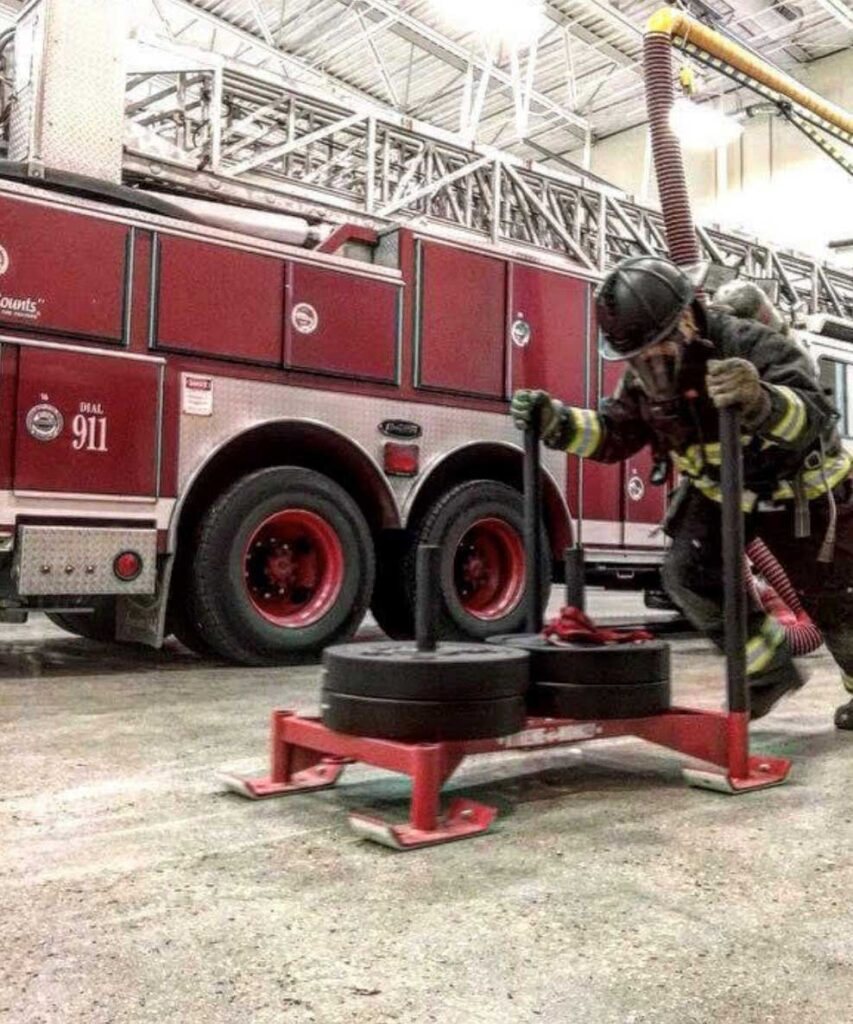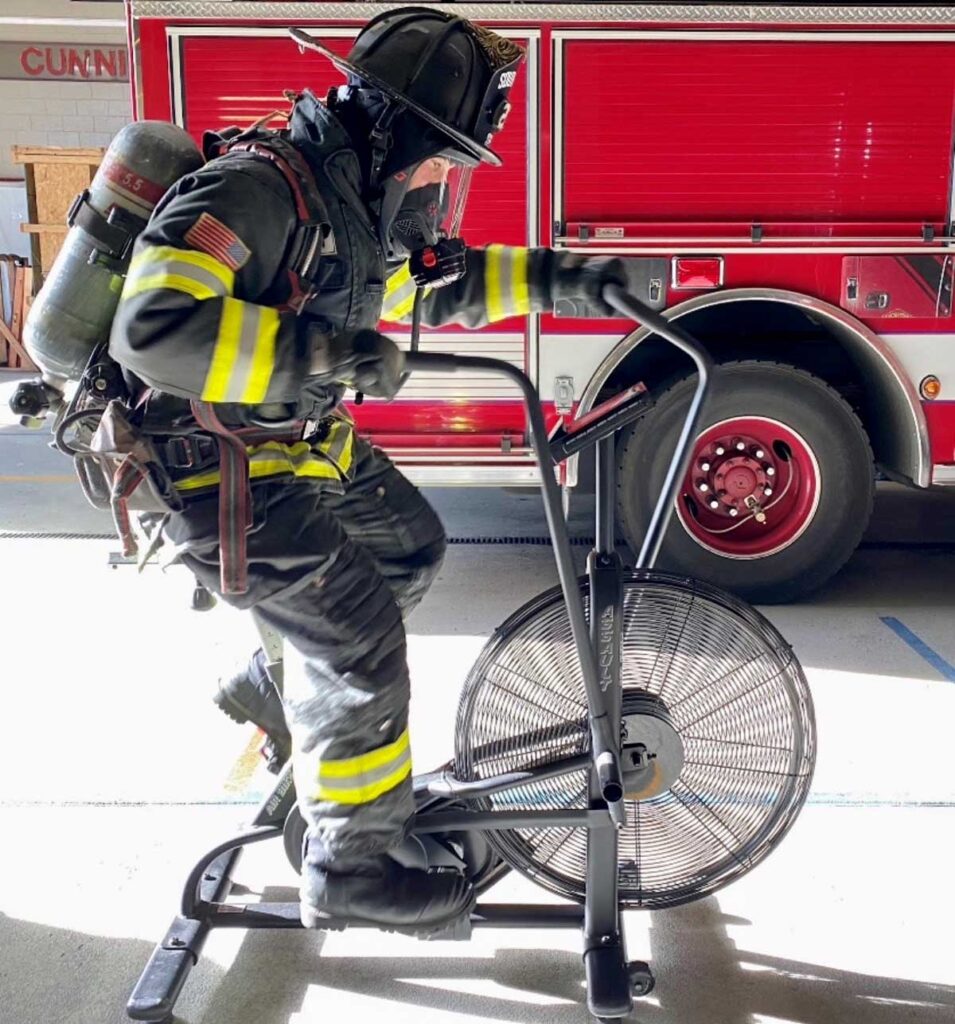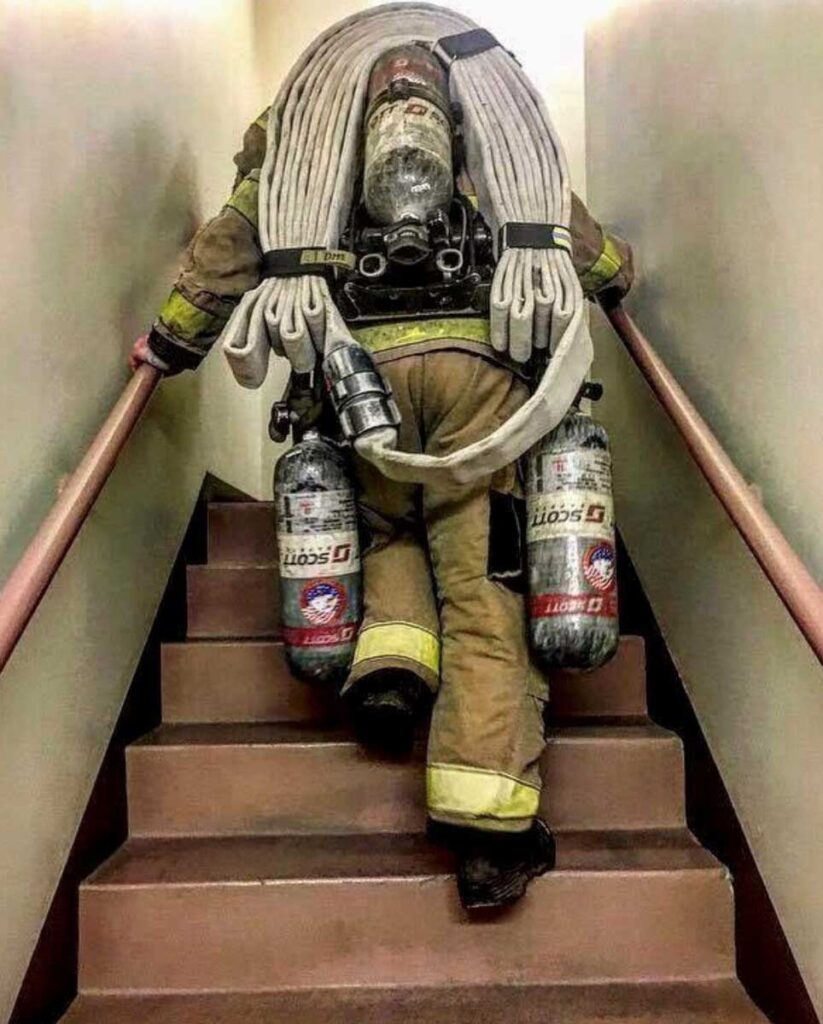By John Spera
Photos by author
We lose the right to be out of shape the day we take the oath. It’s not personal; it’s professional.
The foundation of a prepared firefighter is fitness. Firefighting is a physically demanding job that requires us to show up fit. That leads to the question: why are there so many out-of-shape firefighters?
It has been reported that more than 70 percent of U.S. firefighters are overweight or obese, exceeding the national average for adults and presenting a major threat to their health, wellness, and credibility. It ultimately raises concerns about their survival and that of the people they serve.
- Twenty Hose Exercises for Firefighter Functional Fitness
- Firefighter Fitness on a Budget: 10 Items for Less Than $1,000
- Three 15-Minute Workouts You Can Do While on Shift
In a job built on the qualities of honor, integrity, and discipline, how have so many allowed their fitness to slip? Before I answer the question, let’s define fitness and what that looks like for a firefighter.
Our job is time-dependent. There is a clock ticking on the lives of the people trapped inside, so our work capacity is the most critical aspect of our fitness because work capacity is how much work we can get done in a given period of time. Thus, firefighter fitness comes down to work capacity, which is determined by our skill set, mindset, strength, speed, endurance, power, and ability to recover and do it again.
Our physical performance will make the difference between life and death for others, so our ability to do the most effective work in the least amount of time is at the heart of firefighter fitness and gives our citizens the greatest chance of survival. Notice I didn’t say anything about physical appearance because training for physical appearance will not guarantee physical performance. Still, I assure you if we train for performance, the appearance will follow, meaning your body composition will be able to meet the job’s demands.


Taking the Oath
We raise our right hand and take an oath, saying we will show up prepared. We swore we would, yet so many let their fitness slip, allowing excuses to take over their career.
One of us represents all of us, meaning we have a responsibility to build on the trust all those who came before us earned. What does the public think when they see out-of-shape firefighters shopping in the grocery store or, more importantly, showing up to their emergency?
How have so many made it acceptable in their mind to show up out of shape? Do they feel they earned the right to coast because of time on the job? Are they focusing on other areas of the job that are equally as important, making it okay to skip this one thing, fitness? Or do they straight up hate working out and the discomfort that comes with it? Yes, that’s a thing. We have firefighters all over the country who became firefighters and despise working out.
They had the motivation to do just enough to get through an academy but lacked the discipline to sustain their fitness over a career.
- A Holistic Approach to Tactical Professional Wellness
- Fire Service Training Through Jiu Jitsu
- Five Steps to a Firefighter Fitness/Wellness Culture
I have spoken with hundreds of firefighters over my 20-year career with the goal of helping them get their fitness back, and below are the common reasons they find themselves overweight and out of shape.
1. They don’t fully understand and respect the job’s physical demands. Looking at what we are physically responsible for doing at the physiological level, it’s nothing short of incredible. We fight for life in full personal protective equipment, weighing 100 pounds at times, facing temperatures that rob our body of vital fluids, and raising our core temperatures to levels that erase recall and pattern recognition, simultaneously reaching heart rates that are so high they are challenging to replicate in training. We are doing this while making critical decisions that will determine the outcome of life. It’s more than just showing up to the firehouse and planning meals and the TV shows they will watch. Many don’t see that. They don’t respect the physical demands and great responsibility we have.
2. They don’t have a purpose stronger than their excuses, allowing their feelings to determine whether they work out. What do you mean by purpose? Here’s mine: “I believe my level of fitness will make the difference between life and death for others.” It is simple, to the point, and used to make all my decisions regarding physical training. This allows me to overcome the natural human desire to seek the path of least resistance, the recliner, because I run my decision through my purpose. Since my purpose is stronger than my excuses, I work out.
3. They don’t like being uncomfortable. They don’t see the value in getting uncomfortable and how vital it is to personal growth. Discomfort is their enemy, and they avoid it at all costs. Let’s face it: our jobs are uncomfortable if you are doing them right. Firefighters who consistently work out see the value in physically pushing themselves beyond the obvious fitness aspect. They see how it raises their discomfort threshold and builds the mind and spirit. This allows them to dig deeper, work longer, and embrace the uncomfortable parts of the job. It takes more to make them uncomfortable because they consistently visit discomfort.
4. They rely on motivation, not discipline. An article like this or an inspirational video gets them moving but doesn’t sustain them because the motivation comes and goes. It’s crucial to establish one’s sense of purpose because it will lead to discipline. Discipline is doing what you said you would do when the feeling of wanting to do it is gone. Discipline is what upholds the oath we took and doesn’t allow our feelings to determine our actions.
5. They don’t have time and can’t seem to fit it into their day. We all get the same 24 hours in a day, and it comes down to how we choose to use those hours, our priorities. Binging Netflix, scrolling social media, and playing video games are all taking up time that could be used to work out. If we can’t find 30 minutes to work out, chances are it’s not the time we have a problem with; the previous four reasons mentioned above are the problem. Let’s say you don’t do any of the time-sucking actions mentioned and are truly strapped for time. Rethink your workouts. Consider doing 10 minutes of something: Air bike, walk, run, burpees, pushups, and air squats. Can you find 10 minutes? Can you find 10 minutes twice a day? Because if you do, you will begin to find 15 minutes and then 30 minutes because you are realigning your priorities.

Where to Begin
If you find yourself out of shape, begin to address the five most common reasons mentioned. First, respect and deeply understand the physical demands of the job and the responsibility we have to show up fit. We said we would.
- Drawn by Fire: Too Heavy
- What’s the Difference Between “Training” and “Working Out”?
- The Dichotomy of Minimum Standards
Then, define a purpose stronger than your excuses. Write it down and use it to guide your actions. It could be coming home to your family, honoring your oath, or several things that get to the heart of who you are and why you became a firefighter.
Embrace discomfort and see the value it has in helping you become the best version of yourself. Look for opportunities to get uncomfortable; training, workouts, and skills that need improvement are all opportunities. The more you do this, the more it will take to become uncomfortable. Our comfort zones are dangerous, leading to stagnation and where out-of-shape firefighters live. Our jobs are not comfortable, and that’s what makes them so good and why so many people can’t do them; embrace that.
Stop relying on motivation to lead you into the gym. It will let you down. The previous three action steps will build the mindset required to apply discipline to your workouts, leading to consistently working out regardless of how you feel. It is doing what needs to be done because you said you would.
Make time by making your fitness a priority. Once you have established the previous four action steps, respecting the physical demand and responsibility, defining your purpose, embracing discomfort, and applying discipline, making time to work out will become a natural priority in your life. On the days you truly do not have time, be creative and find five to 10 minutes to get something in. See it as a challenge to get a workout in when everything about the day says you can’t. This will help shape your identity as a no-excuse firefighter who gets it done.
Finally, envision the type of firefighter you want to respond to your family. Be the firefighter you want responding to your family in all areas of the job, including in terms of fitness. That should be your standard, and it is far from the minimum.
John Spera has been a career firefighter for 21 years. He works for South Metro (CO) Fire Rescue on Engine Company 13. John Spera is the founder of Fit to Fight Fire.

